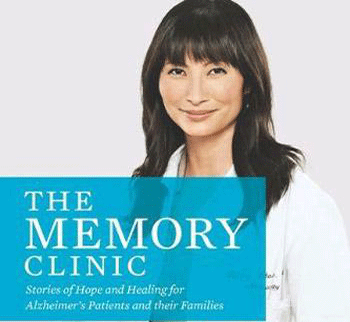TORONTO — Dr. Tiffany Chow, a behavioural neurologist in the Sam and Ida Ross Memory Clinic at Baycrest, has her own story to tell about Alzheimer’s disease.
In her recent book, The Memory Clinic, Stories of Hope and Healing for Alzheimer’s Patients and Their Families, (published by Penguin Group Canada) Chow said that she only recently figured out that her grandmother in Hawaii died of Alzheimer’s, but without the typical memory loss symptoms.
Her grandmother died of a brain hemorrhage in 1995, but Chow said it was only after years of clinical training and experience with Alzheimer’s patients that she recognized the details of her grandmother’s illness were consistent with Alzheimer’s.
Chow began to wonder if she, too, could ward off the effects of Alzheimer’s by building up her own cognitive reserve, just like her grandmother did.
“I tried to discover how my grandmother kept her Alzheimer’s asymptomatic. What did she do, or not do?”
Chow, 46, a married stepmother of two boys, 7 and 8, said she didn’t go into medicine wanting to work with Alzheimer’s patients, “but realized I enjoyed being in close contact with patients and their families.
“I’m in on a more intimate side of people’s lives. I also have a soft spot for older couples. I like seeing how their marriages succeed, and I love the way they care for each other. I often see a connection, even when there is no talking. I get to observe beautiful moments.”
Chow said her literary agent, who urged her to write the book, found it fascinating “that a young, lively person like me enjoyed working with older people.”
She wanted Chow to write a personal book that talks about her resolve to lessen her risk for the disease – she balances her career, with family, regular exercise and healthy eating – and about the life lessons she learns from her patients and their families.
The book, which is written for the layperson, has two distinct messages, Chow said. “First is for the caregiver. Pace yourself and receive help gracefully.
“At the end of the day, the caregiver has done a good job if the patient is pain-free, safe, and having some enjoyable moments. Burnout comes when the caregiver thinks they are not doing enough.”
Chow said she learns a lot from the caregivers, and their stories are told throughout the book.
“They are the experts on each individual person. Part of what I do is make them feel empowered,” Chow said. “They are an important role on our team. We help set them up for success.”
There is less stress when everyone works together, she said. Social networking does the most good.
The book’s second message, Chow said, is prevention. “What [changes] can you make to your lifestyle that are sustainable for you to do now and for the rest of your life? Ask yourself, ‘What should I start and what should I stop?’”
She includes chapters on thinking before you eat, managing stress, and physical activity and the body-mind connection. “I follow the idea of moderation. I like red meat, and although I’m very mindful, I’m not perfect.”
